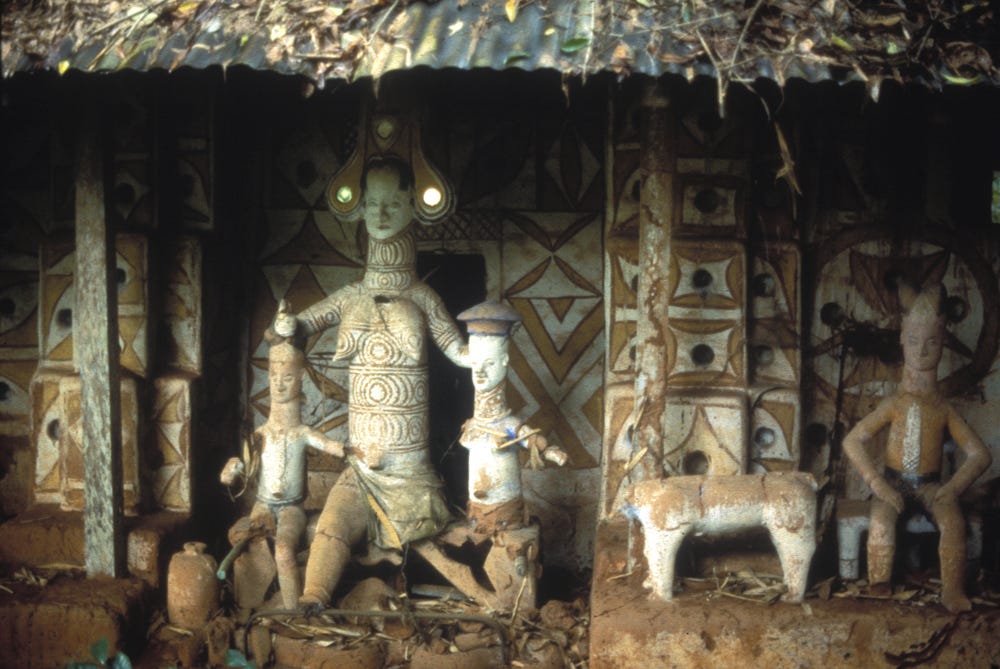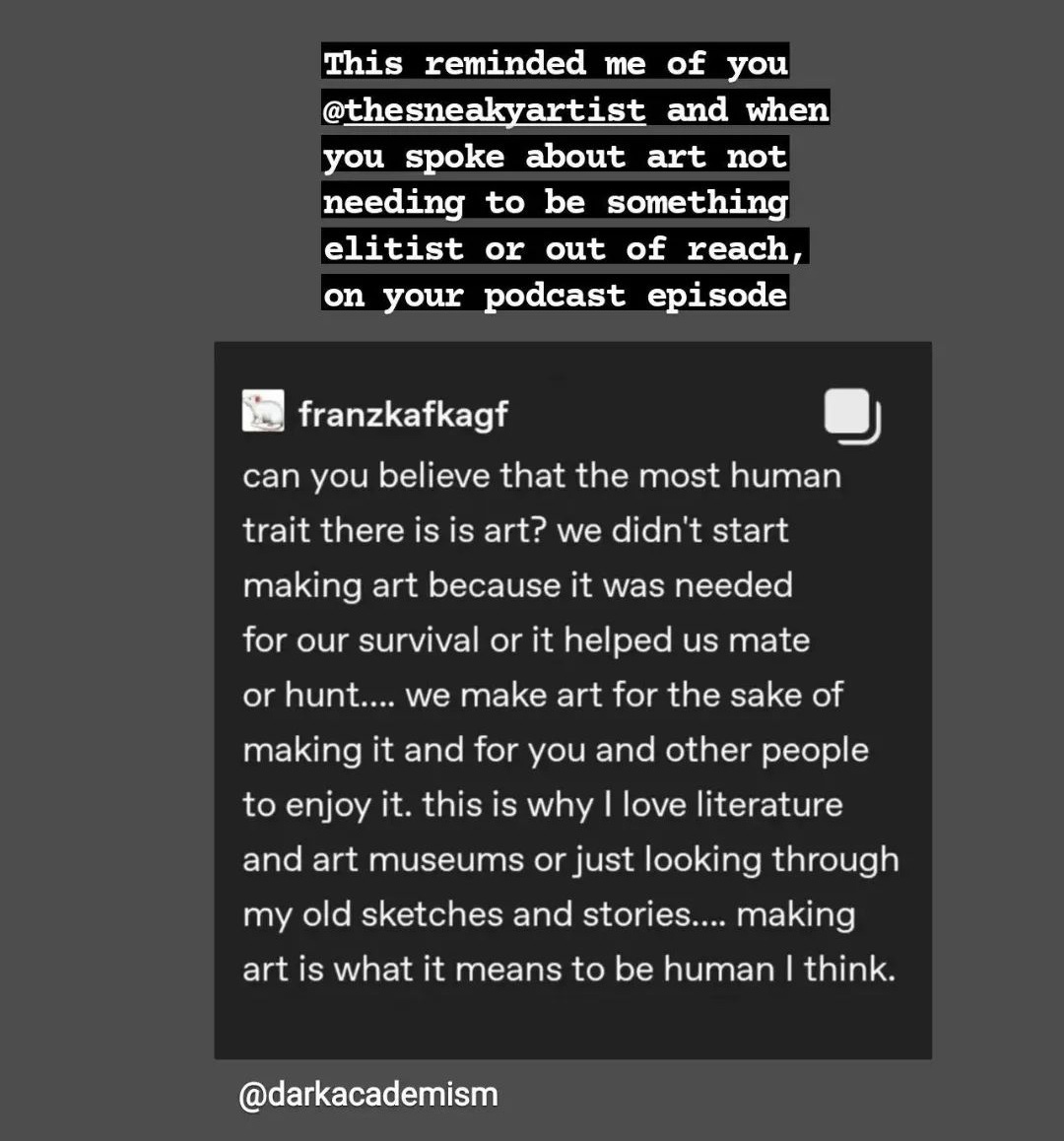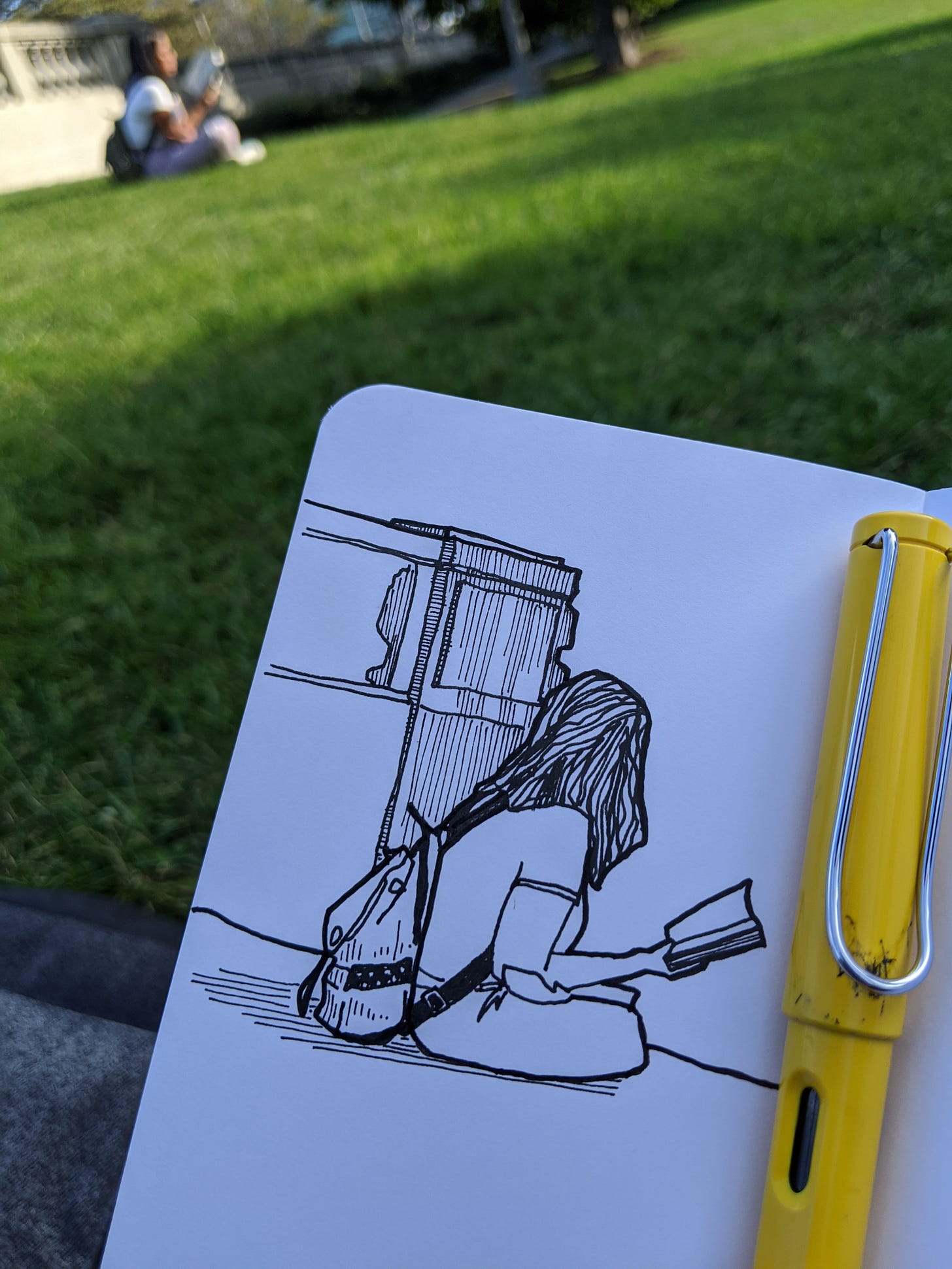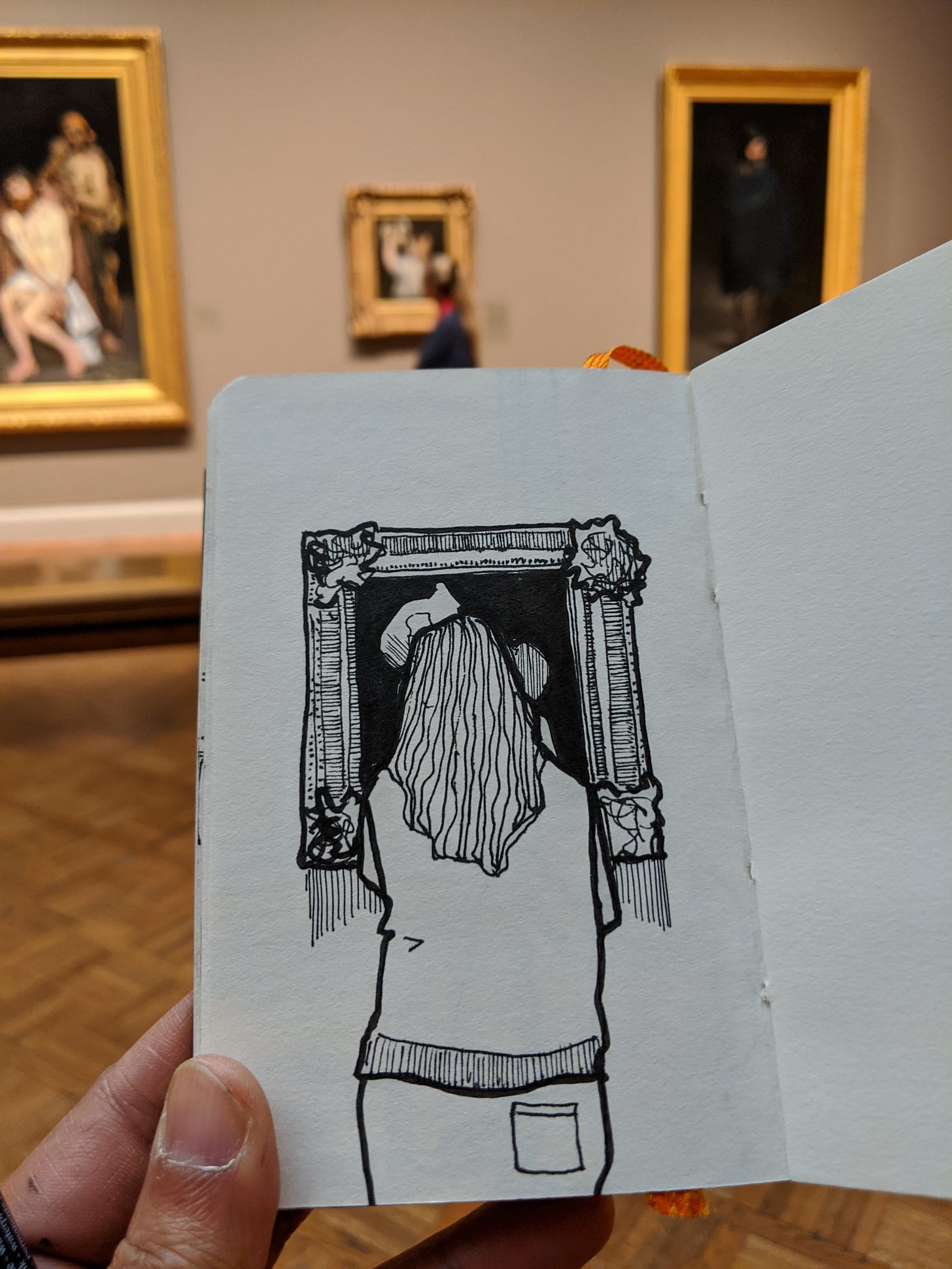95 - Rejecting Gatekeepers
and art as a function of living.
👋🏼 Hello, readers!
Last week, I shared an Insider post with the hypothetical question - Would Da Vinci make a TikTok channel?. This post was Part 1 of a series to further articulate ideas I discussed with Amit Varma on his podcast, The Seen and the Unseen. We had an extended conversation about the creator economy, and the thoughts and philosophies that guide my path within it.
I have received lots of kind words from generous listeners of the show, including this person who contacted me on Instagram this morning.
Today’s post is about this, and the basic function of art in our lives. I hope you like it!
🚪 Gatekeepers of Infinite Games
In too many ways today, we have internalized the idea that questions of art are best left to elite patrons and elite institutions. Not only are we unqualified to think about questions, often we consider ourselves unqualified to understand the answers.
The subject of gatekeeping is very large and complex, seeping into most forms of arts and culture that we consume. But I want to keep the focus on something specific that comes from the feeling that our thoughts on a subject don’t matter.
When we believe that our thoughts on a subject don’t matter, we stop thinking about that subject. This happens at a personal level and also manifests at the societal level. The subject of art is left to professional artists, gallery-owners, curators, and elite patrons. And in doing so, society loses something very fundamental.
As the image above says -
“We didn’t start making art because it was needed for our survival or to help us mate and hunt … we make art for the sake of making it … making art is what it means to be human …”
On the podcast with Amit, I explained that art is different from other creative pursuits like writing. Writing is a great thing, but it is excruciating to actually write. Writing is a great thing to have done. On the other hand, art is joyous in the moment. All the time you spend making art is time well spent.
The difference here is a lot like the difference between finite vs infinite games, another topic we discussed on the show.
A finite game has a specific victory condition. The idea is that victory brings you joy. Think, any sport. An infinite game is played without victory conditions. The idea is that joy lies in the playing of it, and therefore you want to keep playing for as long as possible. Think, life.
So it is a real shame when we give up on making art because we consider ourselves unworthy, because art is only worth it if it is good art, because good art is defined for us by institutions and gatekeepers.
Down with such gatekeepers!
The good things that come from making art do not depend upon making good art or being a talented artist. The result is irrelevant. You can do it simply because it’s a good thing to do, and you will derive the same joy from your time as any accomplished artist.
Exhorting creators to not get bogged down by criticism or lack of success, Neil Gaiman said, “Make good art!”
But I say to you - Make bad art! It’s better than not doing it at all. And I promise, you will have a good time.
A good time. What else is life about?
[On the subject of that Neil Gaiman quote, a fantastic Zen Pencils comic.]
🎨 Art as Citizenship
The Nigerian author Chinua Achebe spoke of art as a form of citizenship when describing the Igbo tradition of Mbari, as I read in this lovely article in The Marginalian (formerly known as Brain Pickings).
“There is no rigid barrier between makers of culture and its consumers. Art belongs to all and is a ‘function’ of society.”
Per the tradition of Mbari, the Earth goddess Ala commands her priests to go door to door, picking out people to participate in building a shrine to her. These individuals will spend a year, or sometimes more, living away from their families and community. They will use earthen materials to build a dedication to Ala.
They are not artists or craftspersons. But for this period that they are serving the goddess, they make art. When they are done, they return to their families and the shrines are enjoyed by everyone in the community.

The idea here is not to defeat the purpose of professional craftspersons or artists, but to bring regular people closer to the concept of making art.
“The idea of mbari does not deny the place or importance of the master with unusual talent and professional experience. Indeed it highlights such gift and competence by bringing them into play on the seminal potentialities of the community. Again, mbari does not deny the need for the creative artist to go apart from time to time so as to commune with himself, to look inwardly into his own soul. For when the festival is over, the villagers return to their normal lives again, and the master artists to their work and contemplation. But they can never after this experience, this creative communal enterprise, become strangers again to one another.” - Chinua Achebe.
If you haven’t, I highly recommend reading Chinua Achebe’s fantastic book, Things Fall Apart.
This Sunday, SneakyArt Insiders will receive Part 2 of this series of ideas. In Part 2 I will cover my personal creative journey, as I shared it with Amit, to reference some profound realizations which changed the trajectory of my creative work and made me into a better person.
Below, a brief excerpt:
When I was in the 7th grade, our English Lit teacher stood me up in the middle of class one day. I don’t remember exactly why, but maybe I had made one joke too many. In front of everyone, he declared - “Nishant, you are the most cynical person I have ever met in my life!”
I took it as a great compliment. I was 12 or 13 years old, and the idea of being cynical beyond the imagination of a grown adult tickled me to no end. Cynicism was smartness. Cynicism was pragmatic. Cynicism was the way of adults. I took pride in my cynicism. It helped me fight off insecurities before the popular guys in school. It helped me deal with my social inadequacies. It gave me a sense of humour. I won many battles with the sharp edge of my wit...
Cynicism was good to me in the early times. It helped me write funny jokes, draw funny comics, and make biting observations about pop culture. Sometimes it helped me go viral on social media…
But one day, I found the fountain of my creativity had gone dry. I could not write. After struggling for many months I came to the conclusion that I had reached the end of the tether with cynicism…
I go on to relate the moment of profound realization and what sparked it, many years after the incident in middle school. I explain how it changed forever my creative work and my personality.
To receive the piece in your inbox, become a SneakyArt Insider!
Hit the button below to grab a free trial of Insider membership. You will have access to the entire archive of subscriber-only content, and receive the new post this Sunday.
But if you’re on board with the SneakyArt Project, I would love for you to become an Insider and help me accomplish the goals I have set myself. Hit the button below to grab a special discount on my annual subscription. Only valid until next week!
All proceeds go directly towards supporting my work as an independent artist, writer, and podcaster. 🙃











“Writing is a great thing, but it is excruciating to actually write.” I think you’re a little rough on us writers, Nishant! The same flow and focus of making art can come to somebody with a pen in hand, using it to write words. I myself didn’t feel whole until I found a way to do both in my work. And what the hell, dude? Your posts are filled with lovely words words words. I hope you enjoy writing them at least a little!
At times, I find writing excruciating, but I also find times when I reach that state of flow writing, and when I do it's just joyous. It has to do with perfectionism, I think, and the way that I tend to judge the quality of my writing as I go. That often kills the joy. Perhaps you are judging your writing more harshly than your art? I hope writing isn't excruciating too often for you.